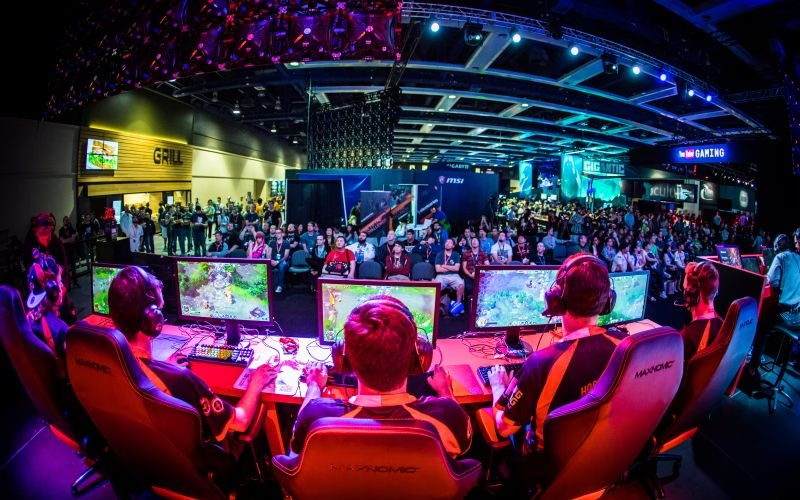- Developers
- Developer Blog
- Blockchain Development
- 10 Ways Blockchain Will Revolutionize The eSports Industry

profile

By Aran Davies
Verified Expert
8 years of experience
Aran Davies is a full-stack software development engineer and tech writer with experience in Web and Mobile technologies. He is a tech nomad and has seen it all.
Want to know 10 ways that blockchain will revolutionize the eSports industry?
That’s a great question that we will answer here.
What challenges does the eSports industry face that Blockchain can help with?
A new industry typically navigates quite a few challenges, and that’s true with eSports too. The gaming industry faces the following challenges:
- Players get only a small percentage of the total industry revenue.
- Gamers and brands don’t have a legitimate, self-sufficient ecosystem.
- Fans and followers have no easy way to know who the players are unless they follow them on platforms like Twitch or YouTube. Read “The undeniable truth of blockchain technology in eSports” for more details.
- There isn’t a transparent system to provide fare rewards to service providers.
- Investment in eSports is hard without a uniform portal facilitating secure participation in eSports. An emerging blockchain-based eSports platform named “eByte eSports Blockchain” has explained this challenge succinctly here.
- The industry needs more content to reach a critical mass. Broadcasters and leagues need to step in and produce content on an appropriate scale.
- Content producers need robust technology solutions to effectively monetize their content.
- Consumers often don’t like ads, and many of them use ad-blockers. That’s a challenge for eSports marketers. Read more about this in “eSports offers major opportunities, but challenges remain”.
How can blockchain revolutionize eSports?
Now that we have a better appreciation of the challenges to the eSports industry and what blockchain is, let’s review how blockchain can transform eSports.
Blockchain can revolutionize eSports as follows:
1. A decentralized platform for eSports
eSports involves quite a few stakeholders, e.g., players, game developers, sponsors, media, advertisers, team managers, etc. They need a comprehensive platform. Blockchain can help here, as follows:
- A blockchain-powered platform can bring these stakeholders under one roof.
- The decentralized platform can help industry stakeholders to connect.
- Amateurs in this space can take advantage of this platform and become professionals.
- Stakeholders use the platform to manage the distribution of prize money, transfer of players, media rights, sponsorship, advertising, fan engagement, and several other aspects.
Read “How blockchain is bringing in the new era of eSports” for more insights into this aspect. DreamTeam and Enjin are examples of such emerging blockchain-based eSports platforms.

Get a complimentary discovery call and a free ballpark estimate for your project
Trusted by 100x of startups and companies like
2. Improve the trust factor in eSports
Let’s face it. You will not devote your time, energy, and resources to an endeavor you don’t feel you can trust. Many potential eSports players have the same feeling. The trust factor needs improvement, and blockchain can help here, as follows:
- The transparency of blockchain enables everyone to see what’s happening on the network. Casual eSports players can feel confident.
- Game developers run the risk of not being paid for their development efforts. With blockchain, they can secure their work and not let anyone use it in an unauthorized manner.
- Smart contracts can act as agreements between game developers and organizers of tournaments. This will ensure that organizers first pay the game developers before using the game.
- The transparency of smart contracts can eliminate the concerns around the unfair distribution of prize money.
There are other areas in the eSports landscape where blockchain can improve trust, but I’m sure you already get the point. Read “How blockchain technology can improve eSports” for more insights.
3. Leveling the playing field
eSports is turning out to be a big business. Deep pockets increasingly matter here, as amateurs find it harder to participate in major tournaments. Blockchain can level the playing field as follows:
- Blockchain lowers the cost of maintaining and operating a secure database. The technology uses a P2P network as its’ foundation and builds redundancy within the distributed database.
- Developers are increasingly finding it easier to develop a blockchain-based “Decentralized App” (DApp) with blockchain platforms like Ethereum, NEO, EOS, and Lisk. Read more about these platforms in “What to plan for when undertaking blockchain software development?”.
These factors combine to lower the entry barrier for new entrants.
4. Cryptocurrency-based secure payment
The eSports industry is striving to counter fraudulent practices. Illegal gambling, match-fixing, etc., are common occurrences, and these are rightly attracting media coverage. Stakeholders worry about getting paid for their services. Blockchain can improve this situation as follows:
- Cryptocurrencies, which are built on blockchain technology, are gaining popularity.
- Crypto transactions are outside the control of governments and banks.
- Blockchain consensus algorithms ensure that cryptocurrency transactions are immutable. For eSports stakeholders, this means that they will receive payments and the transaction won’t bounce.
- Blockchain DApps use smart contracts, and these automatically transfer cryptocurrencies upon fulfillment of predefined conditions. Read about smart contracts in “How to deploy a smart contract on Ethereum?”. This is important for eSports stakeholders since their payment is assured.
- Secure hardware wallets like Ledger Nano S help crypto users secure their digital currencies.
5. Secure in-app purchases
We now have a growing number of eSports sites, eSports apps for mobile, and eSports web apps. Consequently, in-app purchases are also growing. Consumers need secure in-app purchases, and blockchain can facilitate these in the following manner:
- DApps, using secure blockchain networks and digital signatures, can assure consumers about their purchases.
- Crypto-based payment can expedite transactions.
I have examined this topic further in my article “How to create a secure eSports app purchase/payment system using blockchain”.
6. Greater autonomy for players
Match-fixing is a challenge in the eSports space. Managers pressure players to lose games on purpose. It costs vast sums of money to set up tournaments. Therefore, players have a high dependency on organizers and managers. Blockchain can give greater control to players, as follows:
- It reduces the cost of running an eSports platform.
- This, in turn, reduces the cost of organizing tournaments and marketing them.
- Tournament organizers need to remain above board since blockchain transactions are transparent.
- Agreements are open to all for viewing as smart contracts are open-source codes.
Transparency always helps the marginalized stakeholders, therefore, players have better control thanks to blockchain. Read more about this in “4 ways blockchain is going to revolutionize eSports”.
Hire expert developers for your next project
1,200 top developers
us since 2016
7. Streamlining the donations in eSports
Blockchain can streamline the process of accepting donations in eSports. Donations in eSports work as follows:
- eSports viewers donate money as they want their favorite games to flourish.
- Platforms like Twitch or YouTube enable this donation.
- Viewers donate to their favorite gamers.
- However, there is a process called “Chargeback”. A viewer can request the entire money back, and they often do so by stating that the donation was made without their knowledge.
- When a chargeback request is approved, the player needs to return the entire money.
- This puts the players in a disadvantageous position.
With blockchain and cryptocurrency-based payment, transparency improves. Chargeback claims with questionable justifications won’t work. This makes eSports more financially rewarding for players. Read more about this in “How blockchain is taking eSports to the next level”.
8. New loyalty/incentive models
Marketers of eSports are introducing new loyalty/incentive models with the help of blockchain. This works as follows:
- Viewers of eSports receive rewards for their participation.
- They sign up for an eSports broadcast service.
- Viewers either run a browser plug-in or watch the tournament using a particular website.
- They earn loyalty points using cryptocurrencies.
- Unlike traditional loyalty points, viewers can exchange cryptocurrencies for fiat currencies in crypto exchanges that trade in them.
- Alternatively, they can trade these for other cryptocurrencies.
- They can also hold on to these digital assets expecting a future appreciation in their value.
Read “Blockchain decrypted: explaining the technology’s impact on eSports” for more insights.
9. Facilitate the creation and trading of rarer in-game assets
Blockchain can help eSports content producers create rarer in-game assets and enable their trading. This can work as follows:
- In-game assets with the same valuation as other in-game assets can have their corresponding crypto tokens.
- At a given point in time, all such assets will have the same value.
- If you are developing an Ethereum-based eSports platform, then you can use the ERC20 token standard for these assets.
- A blockchain-based platform can facilitate the trading of these tokenized in-game items. Buyers of these assets can also trade them in crypto exchanges.
- You can also create unique and rare in-game assets. Here, each in-game asset will have unique characteristics, therefore, the value will be different from other in-game assets.
- To represent these unique assets using crypto tokens, one should use “Non-Fungible Tokens” (NFTs).
- On the Ethereum blockchain platform, you need to use the ERC721 token standard for these.
Read “Noobs guide to understanding ERC-20 vs ERC-721 tokens” for detailed guidance on this.
10. Easier crowdfunding
Talented eSports developers need sufficient funding to take their promising eSports projects forward. However, as I have already explained, new entrants find it hard to enter the eSports space. This impacts their funding prospects.
Blockchain has a significant potential to transform crowdfunding by making it faster and more transparent.
Read “Blockchain for crowdfunding: 8 possible use cases” to know more about this. Promising eSports developers can take advantage of this and raise the funds they require.
Hire expert developers for your next project
Planning a promising blockchain project in the eSports space?
According to Verified Market Research, “Esports Market was valued at USD 915.30 million in 2018 and is expected to reach a value of USD 2,976.74 million by 2026 at a CAGR of 18.35%”.
Blockchain indeed has the potential to transform eSports. However, it’s a new technology, and blockchain development skills are niche.
The lead time to hire a blockchain developer can be high. Depending on your project requirements, you might need professional help. Read “How to find the best software development company?” before you engage a development partner.
DevTeam.Space has an expert community of blockchain developers. You can easily partner with our blockchain experts by filling out this quick form with your blockchain development project details. One of our technical managers will get back to you to discuss further details.
Frequently Asked Questions on eSports Blockchain
eSports, or “electronic sports,” are organized competitive gaming events. These are video games played on various electronic devices like computers, tablets, smartphones, etc. These are multi-player games organized in various leagues and tournaments. Players can compete individually. Moreover, some eSports also feature competing sports teams.
Some of the challenges faced by the electronic video game industry include less share of game players in the revenue stream, lack of marketing on broadcasting media, game producers being unable to monetize their content, etc.
Blockchain technology can help improve the eSports industry through a decentralized and transparent gaming platform, crowdfunding options, loyalty programs involving digital collectibles for viewers, autonomous game players through open source smart contracts, secure in-app purchases through digital currencies, Incentivization of fan interactions, etc.

Alexey Semeney
Founder of DevTeam.Space
Hire Alexey and His Team To Build a Great Product
Alexey is the founder of DevTeam.Space. He is award nominee among TOP 26 mentors of FI's 'Global Startup Mentor Awards'.
Alexey is Expert Startup Review Panel member and advices the oldest angel investment group in Silicon Valley on products investment deals.


